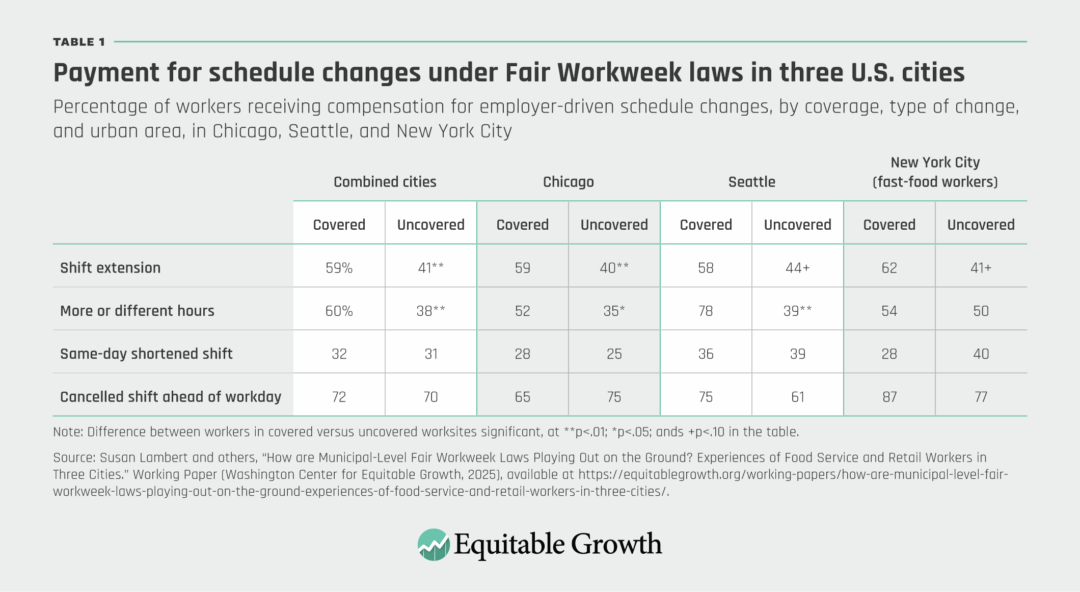Payment for schedule changes under Fair Workweek laws in three U.S. cities

Overview
Fair Workweek laws set new standards for scheduling U.S. workers in jobs and industries characterized by fluctuating and unpredictable work hours, such as jobs in retail and food service. A number of cities and states have implemented these laws in the absence of a federal policy. These laws often feature multiple provisions, including those that govern when and how employers must inform employees of their schedule and how employees are compensated for schedule changes.
There are two types of compensation for schedule changes that employees can qualify for:
- Predictability pay. For employer-driven changes that result in more or the same number of scheduled hours, the laws require employers to ask employees if they agree to work additional or different hours and to then pay them extra for doing so (commonly the equivalent of one extra hour of pay).
- Partial compensation. For employer-driven changes that result in fewer hours, employers do not need to ask employees if they agree to the changes, but employers do need to provide employees with partial compensation for the earnings they lose by having their hours reduced (commonly the equivalent of half of the hours remaining on the shift).
Some employers have expressed concern that Fair Workweek laws will hurt profitability by limiting their ability to adjust their labor supply to changing demand. But the provisions of most Fair Workweek laws do not prohibit employers from making schedule changes—they simply require employers to compensate employees when changes to a work schedule are made.1
In other words, predictability pay can be viewed as a risk-sharing approach to improve employees’ work schedules. Payment for schedule changes is intended to protect labor flexibility for employers while compensating workers for at least some of the costs that schedule changes create, such as earning reductions, disrupted child care or transportation arrangements, or interferences with school and training schedules.
This factsheet reports on findings from two studies of Fair Workweek laws that offer insights into employee compensation for schedule changes and managers’ experiences providing compensation as required by their local Fair Workweek law. The first is a survey of 1,781 retail and food-service workers in Chicago, Seattle, and New York City conducted in 2024, and the second is a four-wave interview study (done between 2017 and 2022) with local managers responsible for implementing Seattle’s Secure Scheduling Ordinancein 139 retail or food-service worksites.2
Most covered workers receive predictability pay
- Fair Workweek laws are spurring retail and food-service employers to provide extra pay for additional or changed hours. When analyzing the combined responses of workers in Chicago, Seattle, and New York City, about 60 percent of workers at covered worksites report having received extra compensation the most recent time a manager requested or required them to extend their shift beyond their scheduled end time or to work an additional or different shift than was on the original schedule. The odds of receiving extra pay for these manager-driven changes are more than twice as high among workers at worksites covered by Fair Workweek laws than among workers at uncovered worksites.
- Receipt of predictability pay is comparable across all three cities studied. More than half of covered workers in Chicago, Seattle, and New York City who should have received predictability pay, according to their local laws, report having received it the most recent time they worked more or different hours in response to a manager’s request. In each city, a significantly smaller proportion of uncovered workers in comparable circumstances report having received extra pay, suggesting that Fair Workweek laws are making a difference in all three cities studied.
- The complexity of exemptions from paying predictability pay make legal compliance—and managers’ jobs—more difficult. Although rates of receiving predictability pay are similar across the three cities we studied, each city offers employers unique ways either to avoid payment for schedule changes or to reduce the amount they pay workers.3 These exemptions mean that whether workers are compensated for incurring the same type of manager-driven schedule changes depends on the city in which they work. Seattle’s Secure Scheduling Ordinance, for example, does not require employers to provide predictability pay for shift extensions if the employee volunteered to stay by responding to a manager’s request sent to multiple employees currently at the worksite. This exemption meant that 38 percent of covered employees in our Seattle sample who incurred a manager-driven shift extension were not eligible for predictability pay. In contrast, their counterparts in Chicago and New York City (at fast-food worksites) were all eligible for this extra compensation
- Predictability pay can provide an incentive for managers to minimize shift extensions. Some Seattle managers talked about how the premium pay requirement made them reluctant to extend employees’ shifts, as reflected in this manager’s response to a question asking how often they request employees to stay beyond their scheduled end time:
Not often, unless there’s like, we had a call out that day or we’re super understaffed for some reason [like] sickness … but usually we try to make it work and not try to ask people to extend because we’d still have to pay the predictive pay if you ask people.
—Apparel retail manager, Seattle, June 2022
- Predictability pay can also be used to incentivize employees to extend their shifts. Some Seattle managers talked about how predictability pay provided them with a new tool for maintaining staffing levels when business surged or employees were tardy, as reflected in this manager’s response when asked how often they request employees to stay beyond their scheduled end time:
Yeah [we extend shifts] …. And generally, whenever we are asking someone to extend their shift, that is always just an extra perk that we let them know, like, “Hey, if you do stay, you can get predictability pay,” and that’s almost their, in a way, incentive if they’re willing to stay longer.
—Apparel retail manager, Seattle, June 2022
Most workers receive partial compensation for shifts cancelled ahead of time—but not for same-day hour reductions
- Almost three-fourths of workers at covered and uncovered worksites report some compensation the most recent time a manager cancelled one of their shifts. Given that a comparable proportion of workers at covered and uncovered worksites in New York City, Seattle, and Chicago report partial payment for cancelled shifts, the Fair Workweek laws may not be driving this practice.
- Only a minority of workers at covered and uncovered worksites report having received partial compensation for lost hours when their managers requested or required them to leave work before their scheduled end time. About a third of employees at covered worksites in all three cities studied who were asked or required to leave work early report that they were partially compensated for the remaining hours, which is comparable to rates of compensation among workers at uncovered worksites.
- Receipt of partial payment for shift cancellations and same-day hour reductions is comparable across the three cities studied. In Chicago, Seattle, and New York City, the majority of workers covered by a Fair Workweek law report being partially compensated the last time a manager cancelled their shift ahead of the workday, but only a minority report being compensated for hours lost due to same-day hour reductions as required by their local law. Fair Workweek laws are thus falling short on smoothing earnings when hours are reduced by management the day of or during a shift.
- Many managers in covered worksites believe that partial compensation for lost hours is not required when they ask for volunteers to leave work early, contrary to all municipal Fair Workweek laws. In all cities, partial compensation is mandatory when a manager requests or requires employees to leave work before their scheduled end time, even when the employee welcomes this change. Only when the employee initiates a request to leave early is partial compensation not required. Our interviews in Seattle suggest that many managers are unaware of or confused by this provision, as illustrated by this conversation with an apparel retail manager in Seattle in 2022:
Manager: “If it’s a slow day and there aren’t a lot of tasks to do … sometimes we do just ask associates if anyone would like to go home early. We don’t ever send anyone home. We just ask them, “Hey, if there’s anyone who would like to go home early today…”
Interviewer: “Would they receive compensation for the hours that they would’ve worked if they completed their full shift?”
Manager: “… from my understanding, if they are sent home, then yes, they do get that compensation. But if it’s something that we present to them as something that’s a voluntary choice and no one’s required to go home … [no].”
Conclusion
Just as an overtime premium compensates hourly employees for working beyond what is conventionally viewed as a reasonable workweek, predictability pay compensates employees for accommodating employer requests for schedule flexibility. Moreover, predictability pay incentivizes managers to limit schedule changes to those really worth it to their businesses. A federal framework that minimizes exemptions from predictability pay could provide a useful foundation for ensuring consistency across municipalities and states, furthering the goal of establishing universal standards for employers and meaningful improvements for employees. The benefits of such a policy would accrue to both employers and workers across the United States. (See Table 1.)
Table 1

Did you find this content informative and engaging?
Get updates and stay in tune with U.S. economic inequality and growth!
End Notes
1. The Fair Workweek retail law in New York City is an exception. There, hour reductions with less than 72-hours notice are banned, and written agreement is needed to add hours to an employee’s schedule if within 72 hours of the workday in question. Although the employer can be fined by the city for not meeting these requirements, there is no provision for payment directly to employees for employer-driven schedule changes in the New York City Fair Workweek retail law.
2. For this brief, we do not include data from retail workers in the New York City area because the city’s Fair Workweek law for retail workers does not include provisions that compensate workers for schedule changes. New York City’s Fair Workweek law governing fast-food worksites does include predictability pay, and these workers are included in our analyses. For details on methodology and findings for both studies, please see the full research reports. SusanLambert and others,“How Are Municipal-Level Fair Workweek Laws Playing Out on the Ground? Experiences of Food Service and Retail Workers in Three Cities” (Washington: WorkRise, 2025), available at https://www.workrisenetwork.org/publications/fair-scheduling-food-service-and-retail-workers; SusanLambert and others, “Seattle’s Secure Scheduling Ordinance 2022 Employer Implementation Report” (Seattle: City of Seattle, Office of the Auditor, 2022), available at https://www.documentcloud.org/documents/23572278-011323-final-secure-scheduling-employer-report; Susan Lambert and Anna Haley, “The Evaluation of Seattle’s Secure Scheduling Ordinance: Year 1” (Seattle: West Coast Poverty Center, 2019), available at https://www.seattle.gov/Documents/Departments/CityAuditor/auditreports/SSO_EvaluationYear1Report_122019.pdf.
3. See Table A1 in appendix of full report. Susan Lambert and others, “How are Municipal-Level Fair Workweek Laws Playing Out on the Ground? Experiences of Food Service and Retail Workers in Three Cities.” Working Paper (Washington Center for Equitable Growth, 2025), available at https://equitablegrowth.org/working-papers/how-are-municipal-level-fair-workweek-laws-playing-out-on-the-ground-experiences-of-food-service-and-retail-workers-in-three-cities/.






Stay updated on our latest research